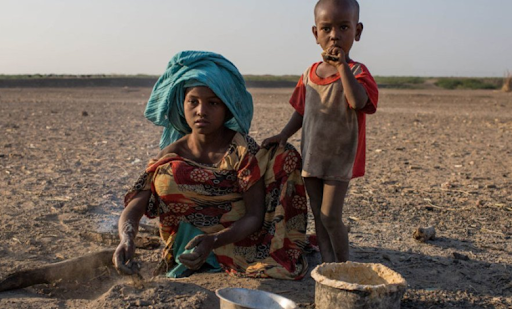Conflict And Climate Shocks Exacerbating Cholera Outbreaks In Horn Of Africa – MSF
The already dire Cholera situation in Africa’s East may see more increase in the coming months.

The Cholera outbreak in Eastern Africa may become even more devastating in the coming months, international humanitarian organisation, Médecins Sans Frontières/Doctors Without Borders (MSF) has said.
This was captured in a piece written by the organisation’s Communications Manager, Tetiana Gavaiuk.
Gavaiuk notes that “shifts in rainfall patterns and a heightened vulnerability to flooding” are likely issues accompanied by the climate-altering event.
El Nino is a climate pattern characterised by an unusual warming of the ocean surface in the central and eastern tropical Pacific Ocean.
El Nino episodes are known to last from nine to 12 months and to occur every two years and/or every seven years.
The climate event triggers heavy rainfall in some parts of Central Asia, the Horn of Africa (region of Eastern Africa), South America, and the southern parts of the United States.
The World Meteorological Organisation had in May stated that El Nino is likely to occur in the later parts of the year.
While the expected increase in rainfall may offer relief to the drought-ridden African region, it can also come in extremes, inadvertently causing flooding, a situation which causes rapid spikes in Cholera outbreaks.
“It might bring respite from the drought in the Horn of Africa and other La Niña-related impacts but could also trigger more extreme weather and climate events. This highlights the need for the UN Early Warnings for All initiative to keep people safe,” Petteri Taalas, WMO Secretary-General is quoted as saying in a report published in May.
Similarly, the Mercy Corps in June, warned that the “El Nino can disrupt weather and climate patterns, leading to destructive floods, an increased likelihood of tropical disease outbreaks (of which Cholera is among), and devastating droughts.”
MSF notes that Nomadic Pastoralist communities who have been affected by Climate shocks and have recorded the loss of livestock and other valuables are moving to urban areas leading to more demand for “already limited services.”
“Often living conditions of internally displaced people in cities are overcrowded and unsanitary, and meeting even minimum standards of hygiene can be impossible,” MSF said, adding that the combination of malnutrition and Cholera may increase the mortality rate in areas where IDPs are situated.
Cholera, a waterborne disease whose spread is closely associated with limited access to Water, Sanitation, and Hygiene (WASH) facilities is known to thrive in places like crowded IDP camps where such facilities are scarce.
Cholera cases have also been known to spike during heavy rains when floods are rampant.
Already, the severe flooding in parts of Somalia and Ethiopia has made the situation more dire as it has “increased the risk of cholera outbreaks, contaminating water sources and contributing to unreliable water supplies and poor sanitation.”
It has also made greatly affected places unreachable for humanitarian organisations such as MSF.
“On day three, heavy rains unleashed widespread flooding; roads and bridges were washed away, forcing us to find alternative routes. Our cars got repeatedly stuck in riverbeds (in a remote community in the Somali region of Ethiopia) and had to be towed out, while the passengers had to alight and cross on foot to make the cars less heavy. We only made it there safely thanks to our skilful drivers,” Mohammed Abdiwahab, an MSF nursing activity manager said, narrating his experience.
Conflict, simultaneous cholera outbreaks, and funding shortfalls are some of the issues MSF says it’s battling in its mission to curb Cholera.
Support Our Journalism
There are millions of ordinary people affected by conflict in Africa whose stories are missing in the mainstream media. HumAngle is determined to tell those challenging and under-reported stories, hoping that the people impacted by these conflicts will find the safety and security they deserve.
To ensure that we continue to provide public service coverage, we have a small favour to ask you. We want you to be part of our journalistic endeavour by contributing a token to us.
Your donation will further promote a robust, free, and independent media.
Donate HereStay Closer To The Stories That Matter




